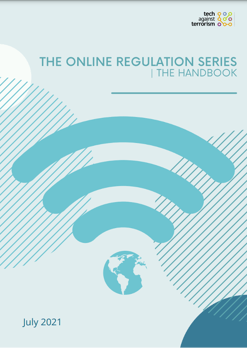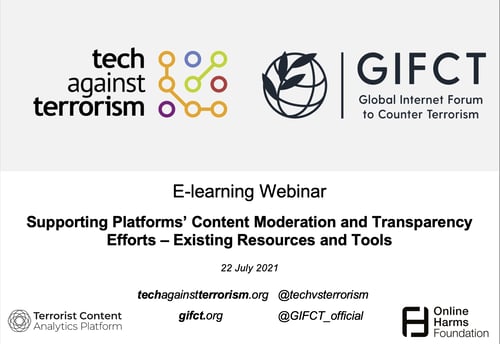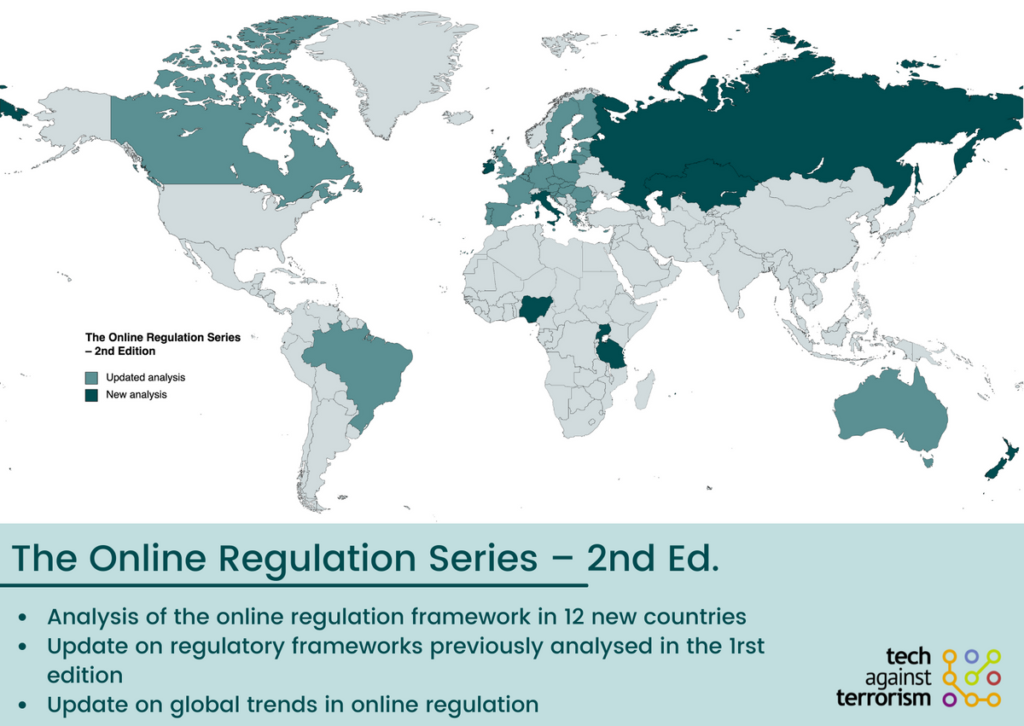July 2021 Update
Publications
- Tech Against Terrorism is pleased to have launched the Online Regulation Series Handbook, providing insight and analysis of over 60 regulations and legislative proposals in 17 countries, including our recommendations for policymakers. You can access the handbook here.
The Handbook is based on analysis published throughout October and November 2020 for the first edition of our Online Regulation Series, and all country analyses have been updated to reflect recent regulatory changes. For each country, we provide a summary of the regulatory framework, key takeaways for tech platforms, and Tech Against Terrorism’s commentary.
The Handbook also includes Tech Against Terrorism’s key recommendations for governments, and an analysis of International Human Rights Law as a possible framework for content regulation and governance.
With this Handbook we aim to provide a comprehensive and accessible resource for tech platforms to improve their understanding of legislative developments and key trends in online regulation. All resources included in the Handbook can be accessed via our relaunched Knowledge Sharing Platform.
With this Handbook we aim to provide a comprehensive and accessible resource for tech platforms to improve their understanding of legislative developments and key trends in online regulation. All resources included in the Handbook can be accessed via our relaunched Knowledge Sharing Platform.
 |
- Last week we released our report on “Gap Analysis on Technical Approaches”, in partnership with the GIFCT. Our report outlines several policy and practical recommendations, including the need to formulate a strategy that encourages stakeholders to work towards a common goal and to ensure that technical solutions are considered alongside policy responses. You can access the full report here.
- On 26 July we released the Tech Against Terrorism Guidelines on Transparency Reporting on Online Counterterrorism Efforts, for tech platforms and governments. Our Guidelines seek to encourage improved meaningful transparency and accountability, from both governments and tech companies, around online counterterrorism activities. You can access the guidelines here.
- On 30 July we released our Trends in Terrorist and Violent Extremist Use of the Internet report, covering the key trends observed by our Open Source Intelligence (OSINT) team over the past six months. You can access the full report here.
Webinars
- Thank you to everyone who tuned in for our latest TAT & GIFCT E-learning Webinar on, “Supporting Platforms’ Content Moderation and Transparency Efforts: Existing Resources and Tools”. If you were unable to attend and would like to access a recording, please get in touch with us at contact@techagainstterrorism.org.
- Agenda:
- Fabienne Tarrant, Research Analyst and Lead on the Knowledge Sharing Platform, Tech Against Terrorism
- Arthur Bradley, Senior OSINT Analyst, Tech Against Terrorism
- Erin Saltman, Director of Programming, GIFCT
- Moderator: Maygane Janin, Senior Research Analyst, Tech Against Terrorism
- Fabienne Tarrant, Research Analyst and Lead on the Knowledge Sharing Platform, Tech Against Terrorism
 |
The Terrorist Content Analytics Platform
- This month (27.06-25.07) the TCAP identified 1,804 URLs containing terrorist content and sent 1,021 alerts to 36 tech companies. 83% of this content is now offline.
- Thanks to all who tuned in to our July Office hours. If you were unable to attend this month and would like access to a recording of the session, please get in touch with us at support@terrorismanalytics.org. You can also request a copy of past Office Hour recordings on our website here.
Speaking Events
- Our Senior Research Analyst, Anne Craanen, was invited to the latest Taking Apart Terror podcast, by the Global Coalition to Defeat Daesh, to provide expert insight on the Islamic State’s use of the internet and our work to counter it. You can access the recording here.
- Anne Craanen participated in the BBC’s Tech Tent podcast episode “Intel’s Road Ahead”, she discussed terrorist use of the internet and our work supporting smaller tech platforms. Listen to the episode here.
- Our Director, Adam Hadley, spoke at the GIFCT Global Summit, discussing key trends in terrorist use of the internet, including terrorist operated websites and emerging tech platforms.
 |
Media Coverage
- Adam Hadley was quoted in a Politico article, in which he discussed Covid-19 misinformation, and the need to clearly differentiate between “racist content” and “terrorist content”.
- POLITICO Europe published an opinion piece by Adam Hadley, responding to law enforcement calls for backdoors to encrypted communications. He underlined that “A backdoor to encrypted communications would have a negligible effect on deterring terrorist activity”, and suggested the forensic use of metadata by law enforcement collect evidence whilst maintaining privacy of communications for users.
What's up next?
- We are set to release our first TCAP transparency report which will detail TCAP statistics and policies, as well as provide information on the platform’s development. We will also elaborate on the next phase and future development.
To stay up to date on our latest work and upcoming events, make sure to follow us on our Twitter and LinkedIn!
Tech Against Terrorism Reader's Digest – 6 August
Our weekly review of articles on terrorist and violent extremist use of the internet, counterterrorism, digital rights, and tech policy.
Top stories
- Apple announced details of a new system to detect child sexual abuse materials (CSAM) on US customers’ devices. The technology will look for matches of already known CSAM, and if a match is found a human reviewer will assess and report the user to law enforcement.
Apple's announcement has been criticised for the risks posed to privacy by digital rights experts. You can find the Electronic Frontier Foundation's response here.
- A 17-year-old from Gloucestershire, UK, was sentenced to a 12-month referral order after downloading far-right violent extremist content and a number of terrorist manuals.
- US President, Joe Biden, commemorated the second anniversary of the El Paso mass shooting by reiterating his commitment to “end domestic terrorism and white supremacy”.
- Australian counterterrorism police charged an individual with terrorism offences, alleging he played a senior role in a Brisbane-based group that maintained a desire to travel to Syria and conduct hostile activities.
Tech Policy
Canada Proposes Plan to Target Illegal Content on Facebook, YouTube, Pornhub and Other Platforms: Aashish Sehrawat investigates a proposed legislation by the Canadian government that aims to limit the spread of unlawful and harmful content on social media platforms. The proposal targets five forms of criminal content to be kept off the web, including child pornography and terrorist material. Platforms that do not comply with removing this content may face new penalties with fines of up to $10 million or 3% global total yearly revenue – whichever is higher. The proposal will also implement an Advisory Council and the “Digital Resource Council of Canada”, that would make binding decisions on content removal. Sehrawat relays concerns that the latest will act as a “court that is going to be passing judgement on the legality of speech”. There are also fears from civil society that this legislation may not only impede free speech, but also overlook some online harms such as disinformation, with some saying that this legislation should be viewed more as an “illegal-content bill” rather than an online harms bill. (Sehrawat, TechStory, 31.07.21)
You can read our analysis of online regulation in Canada in our recently released Online Regulation Handbook.
Jihadists Flood Pro-Trump Social Network with Propaganda: Mark Scott and Tina Nguyen report on the influx of terrorist propaganda spread by supporters of the Islamic State (IS) on the pro-Trump social network GETTR. The platform is in an “awkward position of providing safe haven for jihadi extremists online” as it attempts to establish itself as a free-speech alternative to large social-media platforms. GETTR’s policy to not censor content has caught the attention of IS and similar ideological groups as they seek new online spaces to disseminate their hateful material. The authors find that the availability of such materials, alongside a number of far-right violent extremist materials, represents the difficulty of balancing GETTR's free speech ethos with demands to stop terrorist material from finding an audience online. For Scott and Nguyen, GETTR represents another “experiment” from Islamic State as they seek new audiences and a broader reach. (Scott and Nguyen, Politico, 02.08.21)
Terrorism and Violent Extremism
How Will Violent Extremists Use Technology in the Future?: Marigny Jane Kirschke-Schwart and Clarke analyse how terrorists and violent extremists will develop their use of technology in the future. There is a primary concern over 3D printed technology becoming more commonplace. The authors note that this technology is largely being misappropriated by far-right violent extremists and the possibility of lethal, untraceable weapons becoming more accessible. The authors are also concerned by the increasing use of drones by violent extremist actors. The Islamic State (IS) have been prolific in using technology in their activities as drones were used for surveillance and recruitment efforts, as well as weaponised to be deployed against opposition forces. Although far-right violent extremists are yet to use weaponised drones, there is evidence of this technology being used prior to an attack. Despite the societal benefits of these technologies, the authors note that as they become more commonplace, the more opportunities this will offer to nefarious actors. (Kirschke-Stewart and Clarke, GNET, 02.08.21)

